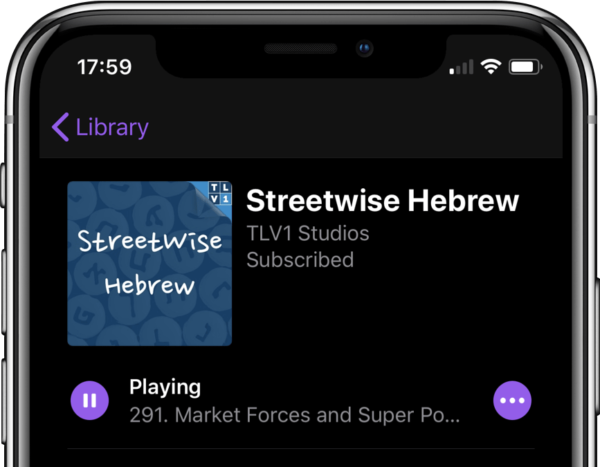In Hebrew, מלא (malé) means full, just like how we feel after eating too many french fries. So what does the phrase מודה בפה מלא, literally, I admit with a full mouth, mean?
On this episode, Guy explains the root מ.ל.א
New Words and Expressions:
Malé, mele’ah – Full – מלא, מלאה
“Ani zocher be-leilot shel yare’ach malé” – I remember, on full moon nights – אני זוכר בלילות של ירח מלא
“Ani makpida lehagid she-ani shmena, ani lo mele’a, o mele’a ba-mekomot ha-nechonim” – I insist on saying that I am fat, I am not chubby, or full in the right places.” – אני מקפידה להגיד שאני שמנה, אני לא מלאה במקומות הנכונים
Bachur malé – Chubby guy – בחור מלא
Bachura mele’ah – Chubby girl – בחורה מלאה
“Banot pashut hayu yoter mele’ot” – Girls simply used to be curvier – בנות פשוט היו יותר מלאות
“Ve-ze nechshav la-yofi ha-ultimativi” – And it was considered the ultimate beauty – וזה נחשב ליופי האולטימטיבי
Mele’im ad efes makom – Filled to capacity – מלאים עד אפס מקום
Ha-ganim ha-leumiyim mele’im ad efes makom – The national parks are filled to capacity – הגנים הלאומיים מלאים עד אפס מקום
Tfusa mele’a – Full occupancy – תפוסה מלאה
Modé be-fe malé – I fully admit – מודה בפה מלא
Ledaber be/im pe malé – To speak with your mouth full – לדבר ב/עם פה מלא
Asita malé ta’uyot – You made lots of mistakes – עשית מלא טעויות
Hayu sham malé anashim – There were lots of people there – היו שם מלא אנשים
Ani save’a/sve’ah – I am full (food) – אני שבע/שבעה
Ani malé/mele’ah – I am full (food, coll.) – אני מלא/מלאה
“Slicha, ani ma-ze malé/mele’ah, lo mesugal/mesugelet” – Sorry, I am so full, I just can’t – סליחה, אני מה זה מלא/מלאה, לא מסוגל/ת
“Yashavnu ve-achalnu, hitmaléti chips” – We sat and ate, I filled myself with chips – ישבנו ואכלנו התמלאתי צ’יפס
“Al titmal’u, tash’iru makom la-ochel” – Don’t get too full, leave some room for the food – אל תתמלאו, תשאירו מקום לאוכל
“Al titmal’u yoter midai, yesh harbe ochel” – Don’t get too full, there’s a lot of food – אל תתמלאו יותר מדיי, יש הרבה אוכל
“Yow, ma-ze hitmaleti” – Wow, I am so full – יואו, מה זה התמלאתי
Ha-otobus hitmalé – The bus became full – האוטובוס התמלא
Otobus Ha-shabat – The shabbat bus – אוטובוס השבת
Playlist and Clips:
Knesiyat Ha-sechel – Hayinu Osim Ahava (lyrics)
Mele’im ad efes makom – Filled to capacity
Ishai Ribo – Ha-nisayon ha-ze (lyrics)
Sarit Avitan – Lo Mat’imim (Lyrics on youtube)
Shalom Hanoch – Tiyul Le-Yafo (lyrics)
Want to see more Hebrew gems? Like Streetwise Hebrew on Facebook and Instagram.
Want Guy to talk about a pressing Hebrew issue? Find him at StreetwiseHebrew.com or follow him on Twitter.






Guy,
Another great show. Can’t wait for Part 2 of Mal-eh.
In Ulpan, I learned that L’hitakaish means to insist. You translate “Ani Makpeda” also as to insist. So, I went to my (five-volume) Alcalay dictionary and it said that Makpeda means to be strict. Obviously, it is the same universe of meaning, but when do I (properly) use each of them, or are they interchangeable?
Seth
Toda for the question, Seth
See here:
https://www.morfix.co.il/%D7%9C%D7%94%D7%A7%D7%A4%D7%99%D7%93
I translated “Ani makpida” in its context, but of course, semantic fields are never clear cut.
See different cases here:
https://context.reverso.net/translation/hebrew-english/%D7%9E%D7%A7%D7%A4%D7%99%D7%93%D7%94
https://context.reverso.net/translation/hebrew-english/%D7%9E%D7%A7%D7%A4%D7%99%D7%93%D7%99%D7%9D